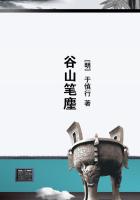"Miss Sherwood, I'm going to ask another favor of you. In connection with a bet I made with Mr. Hunt. I want to talk with a picture dealer--the best one there is. I can't very well go to him. Can you manage to have him come here?"
"Easily. I know the man best for your purpose. I'll telephone, and if he's in New York he'll come to see you this afternoon."
"Thank you."
She started out, then turned. "Better finish your business with him to-day if you can. We go to the country to-morrow or the day after.
I've just had word that the workmen are finally out of the house; though the grounds, of course, are in bad shape, and will probably remain so. With this labor situation, it's practically impossible to get men."
Larry remembered something else. "Miss Sherwood, you recall my once speaking about a man I got to be friends with in prison--Joe Ellison?"
"Yes."
"I've written him, under an assumed name, of course, and have had an answer. He'll be out in a very few days now. He's through with his old ways. I know he'd like nothing better than a quiet place to work, off to himself somewhere. I'm sure you can trust him."
"We'll arrange to have him come out to Cedar Crest. Oh, don't think I'm being generous or sentimental," she interrupted smilingly as he started to thank her. "I'd be glad to put two or three more ex-convicts to work on our place if I could get them. And so would my friends; they can't get workmen of any kind."
That afternoon the picture dealer came. Miss Sherwood introduced Larry to him as Mr. Brandon, her cousin, and then left the two men together.
Larry appraised Mr. Graham as a shrewd man who knew his business and who would like to score a triumph in his own particular field. He decided that the dealer had to be handled with a great deal of frankness, and with some stiff bluffing which must appear equally frank. The secret of Larry's earlier success had been to establish confidence and even enthusiasm in something which had little or no value. In selling an honest thing at an honest price, the first and fundamental procedure was the same, to establish confidence and, if possible, enthusiasm.
From the moment of introduction Larry quietly assumed the manner of an art collector who was very sure of himself; which manner was abetted by the setting of the Sherwood library. He felt something of the old zest when wits had been matched against wits, even though this was to be a strictly honorable enterprise.
"You know the work of Mr. Jerome Hunt?" he asked.
"I have handled practically all his work since he began to sell," replied Mr. Graham.
"I was referring to work in his recent manner."
"He has not been doing any work recently," corrected Mr. Graham.
"No?" Larry picked up the Italian mother which for this occasion he had mounted with thumb-tacks upon a drawing-board, and stood it upon a chair in the most advantageous light. "There is a little thing in Mr. Hunt's recent manner which I lately purchased."
Mr. Graham regarded the painting long and critically.
Finally he remarked:
"At least it is different."
"Different and better," said Larry with his quiet positiveness. "So much better that I paid him three thousand dollars for it."
"Three thousand!" The dealer regarded Larry sharply. "Three thousand for that?"
"Yes. And I consider that I got a bargain."
Mr. Graham was silent for several moments. Then he said "For what reason have I been asked here?"
"I want you to undertake to sell this picture."
"For how much?"
"Five thousand dollars."
"Five thousand dollars!"
"It is easily worth five thousand," Larry said quietly.
"If you value it so highly, why do you want to sell?"
"I am pressed by the present money shortage. Also I secured a second picture when I got this one. That second picture I shall not sell. You should have no difficulty in selling this," Larry continued, "if you handle the matter right. Think of how people have started again to talk about Gaugin: about his starting to paint in a new manner down there in the Marquesas Islands, of his trading a picture for a stick of furniture or selling it for a few hundred francs--which same paintings are now each worth a small fortune. Capitalize this Gaugin talk; also the talk about poor mad Blakeslie. You've got a new sensation. One all your own."
"You can't start a sensation with one painting," Mr. Graham remarked dryly.
This had been the very remark Larry had adroitly been trying to draw from the dealer.
"Why, that's so!" he exclaimed. And then as if the thought had only that moment come to him: "Why not have an exhibition of paintings done in his new manner? He's got a studio full of things just as characteristic as this one."
Larry caught the gleam which came into the dealer's eyes. It was instantly masked.
"Too late in the spring for a picture show. Couldn't put on an exhibition before next season."
"But why not have a private pre-exhibition showing?" Larry argued--"with special invitations sent to a small, carefully chosen list, putting it over strong to them that you were offering them the chance of a first and exclusive view of something very remarkable. Most of them will feel flattered and will come. And that will start talk and stir up interest in your public exhibition in the fall. That's the idea!"
Again there was the gleam, quickly masked, in the dealer's eyes. But Larry got it.
"How do I know this picture here isn't just an accident?--the only one of the sort Mr. Hunt has ever painted, or ever will paint?" cautiously inquired Mr. Graham. "You said you had a second picture.
May I see it?"
Larry hesitated. But he believed he had the dealer almost "sold"; a little more and Mr. Graham would be convinced. So he brought in Maggie's portrait. The dealer looked it over with a face which he tried to keep expressionless.
"How much is this one?" he asked at length.
"It is not for sale."
"It will bring more money than the other. It's a more interesting subject."
"That's why I'm keeping it," said Larry. "I think you'll admit, Mr. Graham, that this proves that Mr. Hunt is not now painting accidents."















